Arts & Entertainment
Bawdy bordello
Highly entertaining ‘Whorehouse’ production opens Signature season
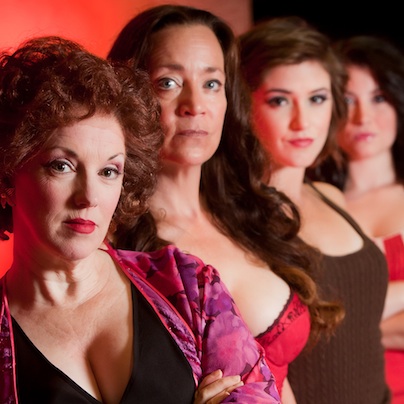
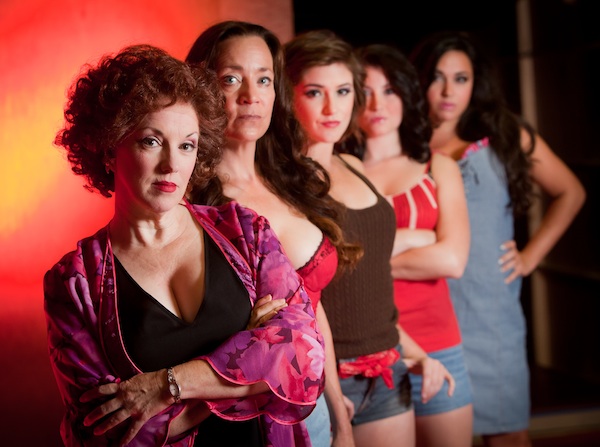
Sherri L. Edelen, left, as Miss Mona with cast members Amy McWilliams, Nora Palka, Jamie Eacker and Nadia Harika. (Photo by Christopher Mueller; courtesy Signature)
‘The Best Little Whorehouse in Texas’
Signature Theatre
4200 Campbell Avenue
Arlington, Va.
Through Oct. 7
$40-$80; $30; rush tickets available
It takes a combination of exceptionally good source material and competent theatrical savvy to infuse a work from the late ‘70s with a fresh and timely feel, but that’s just what Signature Theatre has done with its current production, a mostly solid and highly entertaining adaptation of “The Best Little Whorehouse in Texas” with which it’s opening its 23rd season.
With its focus on sexual hypocrisy, political treachery and media sensationalism, the plot could have been ripped from today’s headlines. Instead, it’s based on a real piece of Texas history — the closing of the infamous Chicken Ranch in La Grange, Texas in 1973. The musical moves the action to the fictional town of Gilbert in 1978. The Chicken Ranch is run by the wily and earthy Miss Mona (Sherri L. Edelen). Working closely with the tough-talking Sheriff Earl Dodd and maintaining a strict set of rules, Miss Mona creates a refuge for her “ladies” and a pleasant atmosphere for her guests.
Unfortunately, the house is discovered by Melvin P. Thorpe, a seedy, self-styled, self-serving media watchdog who decides that the house must be closed down. State and local politicians try to ignore the furor, but Thorpe stages a raid just as the fabled Aggies football team arrives to celebrate their big victory. The oily Governor forces the Sheriff to shut down the Chicken Ranch and Miss Mona and her girls are forced to leave what has become their home and safe haven.
The musical features a tight book by Larry L. King (the D.C.-based author, not the CNN newsman) and Peter Masterson that is folksy without ever being cloying, and music and lyrics by Carol Hall. Hall’s score is an effective blend of rousing production numbers and intimate country ballads and her clever lyrics are playful and witty without ever being too explicit. After all, as Miss Mona says with a wicked twinkle in her eye, “There’s nothing dirty going on.” In fact, the show, which was rather controversial when it opened (newspapers refused to run ads for the production and CBS heavily censored “The Aggie Song” during the Tony broadcast), seems almost tame today.
The vibrant Edelen effortlessly leads a strong cast through a complex combination of broad satire, astute social commentary and the moving details of lives torn apart by cruelty, cowardice and political opportunism. She’s got a powerful voice, a wry smile and delicious comic timing along with a sure hand with the heart-felt book scenes and when the time finally comes, solid two-step abilities. Nova Y. Payton rocks the house as Mona’s assistant, Jewel. Their duet “No Lies” is bound to be a highlight of the theater season. Other strong performances are turned in by Thomas Adrian Simpson as the Sheriff, Dan Manning as the slick-tongued and nimble-footed Governor and Christopher Bloch as Melvin P. Thorpe, an amusingly sleazy blend of Geraldo Rivera and Jerry Falwell.
There are, unfortunately, a few missteps in the production. The offstage band is small but way too loud and bass heavy. The opening number is flat with static staging and boring distracting projections. Overall, the design work is uneven. For example, the red and black lingerie pieces for the girls don’t fit the ambience at the Chicken Ranch and the boys don’t even bother to dress up for their big night at the whorehouse.
The most serious flaw in the production, however, is the staging of many of the lovely ballads. Just when the show needs some breathing room and just when the characters have something important to share, the numbers are loud, rushed and poorly lit.
Overall though, the production — helmed by Eric Schaeffer (Signature’s artistic director) — is redeemed with its outstanding ensemble. The talented team creates sharply individualized characters, especially Madeline Botteri as Shy (her finely wrought performance highlights how the show thoughtfully addresses the realities of prostitution). They flawlessly execute Karma Camp’s delightful choreography. Her high-stepping dance routines are exhilarating, especially the ladies’ thrilling kick line that caps off “A Lil’ Ole Bitty Pissant Country Place,” the toe-tapping shenanigans of “Texas Has a Whorehouse In It” and “The Sidestep.” There’s also incredible athletic artistry in “The Aggie Song,” where the boys change out of their football uniforms and lustily prepare for their night with the ladies.

Cupid’s Undie Run, an annual fundraiser for neurofibromatosis (NF) research, was held at Union Stage and at The Wharf DC on Saturday, Feb. 21.
(Washington Blade photos by Michael Key)








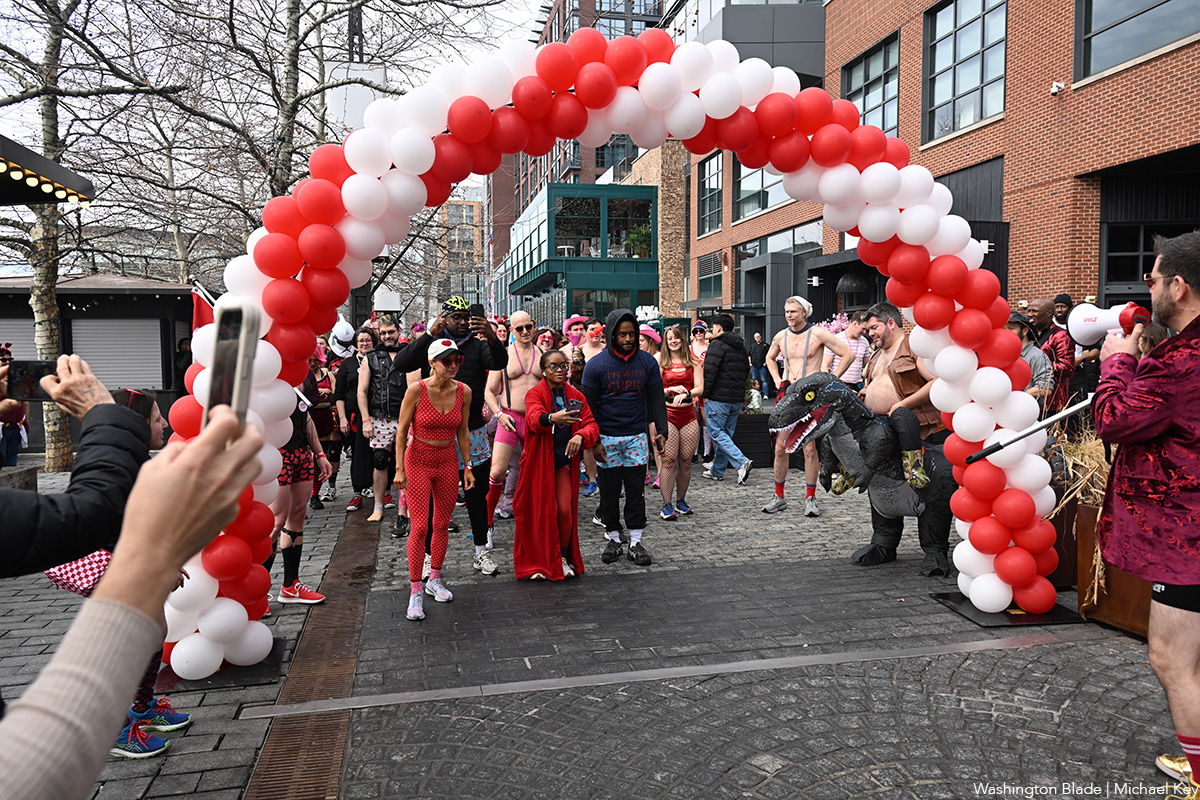
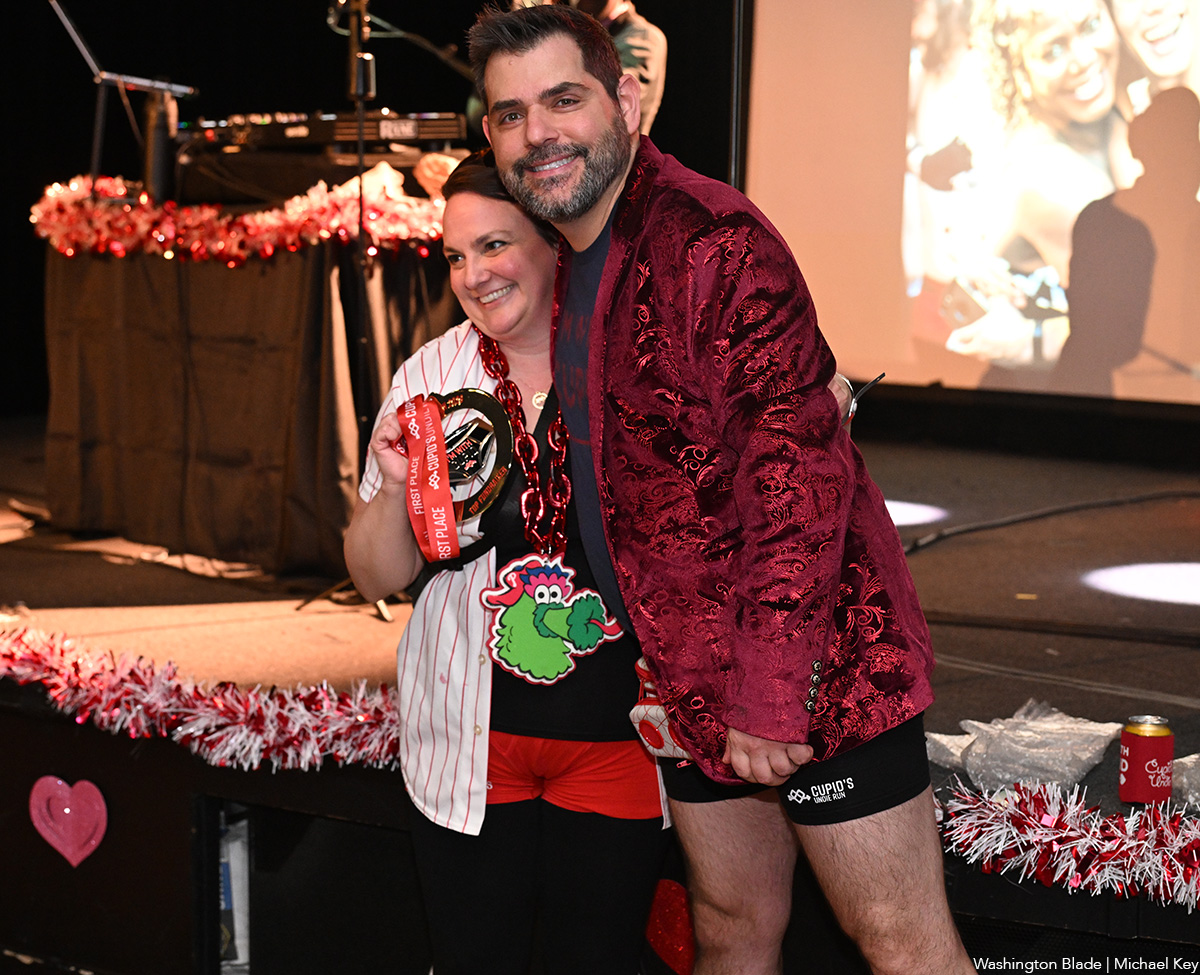
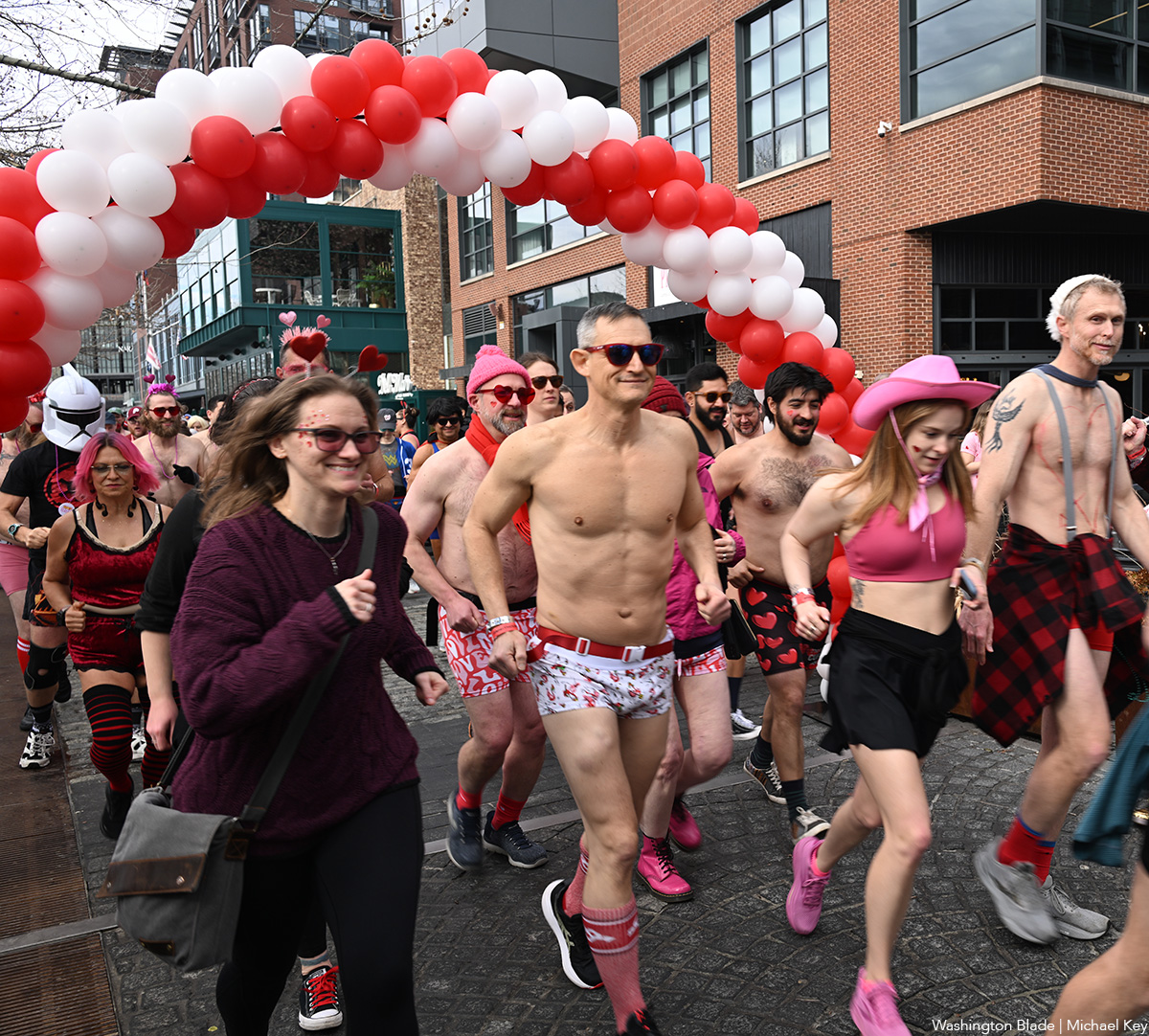

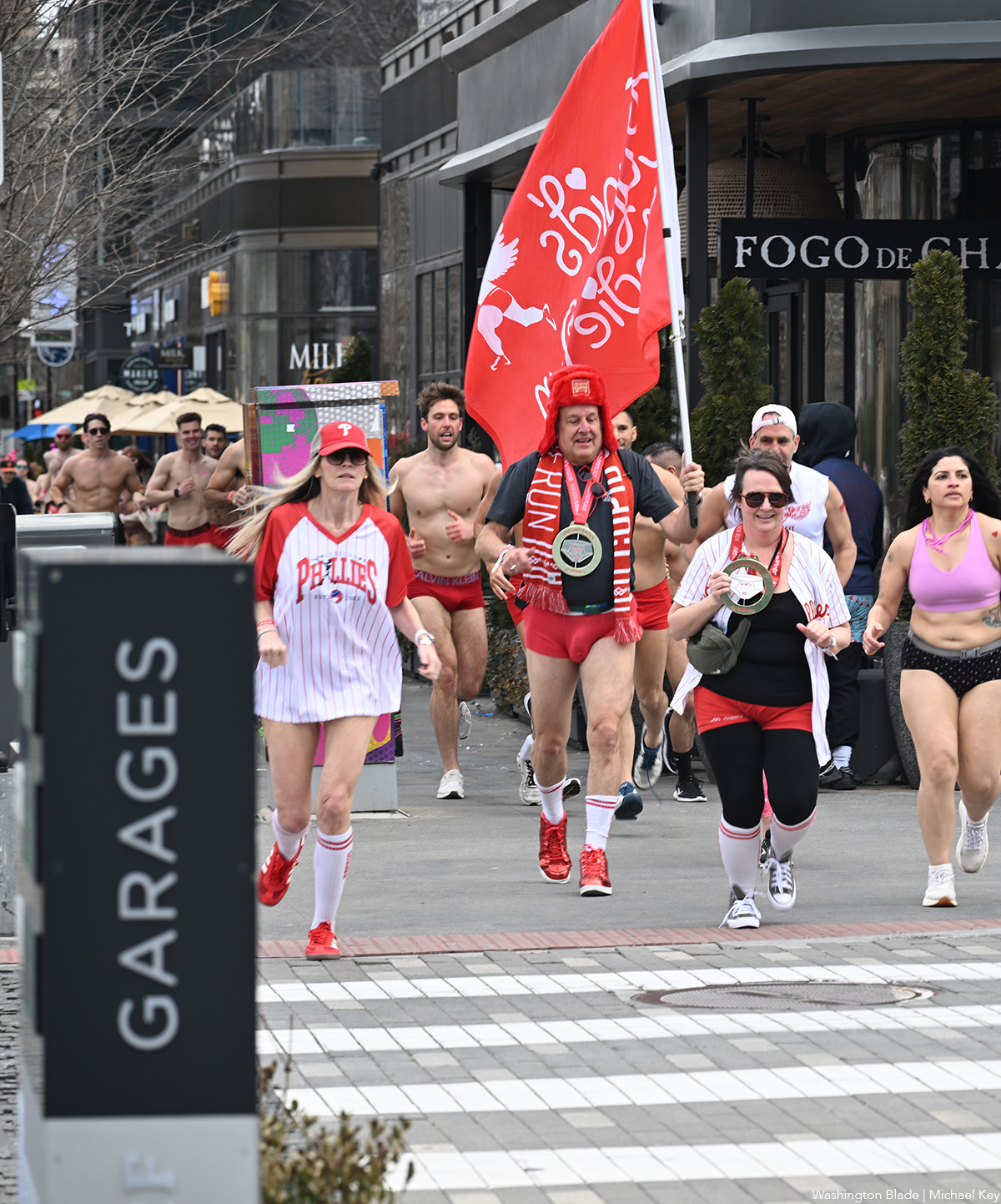

Sweat DC is officially expanding to Shaw, opening a new location at 1818 7th St., N.W., on Saturday, March 28 — and they’re kicking things off with a high-energy, community-first launch event.
To celebrate, Sweat DC is hosting Sweat Fest, a free community workout and social on Saturday, March 14, at 10 a.m. at the historic Howard Theatre. The event features a group fitness class, live DJ, local food and wellness partners, and a mission-driven partnership with the Open Goal Project, which works to expand access to youth soccer for players from marginalized communities.
For more details, visit Sweat DC’s website and reserve a spot on Eventbrite.

Friday, Feb. 20
Center Aging Monthly Luncheon with Yoga will be at noon at the D.C. LGBTQ+ Community Center. Email Mac at [email protected] if you require ASL interpreter assistance, have any dietary restrictions, or questions about this event.
Trans and Genderqueer Game Night will be at 7 p.m. at the D.C. Center. This will be a relaxing, laid-back evening of games and fun. All are welcome! We’ll have card and board games on hand. Feel free to bring your own games to share. For more details, visit the Center’s website.
Go Gay DC will host “First Friday LGBTQ+ Community Social” at 7 p.m. at Hotel Zena. This is a chance to relax, make new friends, and enjoy happy hour specials at this classic retro venue. Attendance is free and more details are available on Eventbrite.
Saturday, Feb. 21
Go Gay DC will host “LGBTQ+ Community Brunch” at 11 a.m. at Freddie’s Beach Bar & Restaurant. This fun weekly event brings the DMV area LGBTQ community, including allies, together for delicious food and conversation. Attendance is free and more details are available on Eventbrite.
LGBTQ People of Color will be at 7 p.m. on Zoom. This peer support group is an outlet for LGBTQ People of Color to come together and talk about anything affecting them in a space that strives to be safe and judgement free. There are all sorts of activities like watching movies, poetry events, storytelling, and just hanging out with others. For more information and events, visit thedccenter.org/poc or facebook.com/centerpoc.
Sunday, Feb. 22
Queer Talk DC will host “The Black Gay Flea Market” at 1 p.m. at Doubles in Petworth. There will be more than 15 Black queer vendors from all over the DMV in one spot. The event’s organizers have reserved the large back patio for all vendors, and the speak easy for bar service, which will be serving curated cocktails made just for the event (cash bar.) DJ Fay and DJ Jam 2x will be spinning the entire event. For more details, visit Eventbrite.
Monday, Feb. 23
“Center Aging: Monday Coffee Klatch” will be at 10 a.m. on Zoom. This is a social hour for older LGBTQ adults. Guests are encouraged to bring a beverage of choice. For more information, contact Adam at [email protected].
Tuesday, Feb. 24
Coming Out Discussion Group will be at 7 p.m. on Zoom. This is a safe space to share experiences about coming out and discuss topics as it relates to doing so — by sharing struggles and victories the group allows those newly coming out and who have been out for a while to learn from others. For more details, visit the group’s Facebook.
Genderqueer DC will be at 7 p.m. on Zoom. This is a support group for people who identify outside of the gender binary, whether you’re bigender, agender, genderfluid, or just know that you’re not 100 percent cis. For more details, visit genderqueerdc.org or Facebook.
Wednesday, Feb. 25
Job Club will be at 6 p.m. on Zoom upon request. This is a weekly job support program to help job entrants and seekers, including the long-term unemployed, improve self-confidence, motivation, resilience and productivity for effective job searches and networking — allowing participants to move away from being merely “applicants” toward being “candidates.” For more information, email [email protected] or visit thedccenter.org/careers.
Asexual and Aromantic Group will meet at 7 p.m. on Zoom. This is a space where people who are questioning this aspect of their identity or those who identify as asexual and/or aromantic can come together, share stories and experiences, and discuss various topics. For more details, email [email protected].
Thursday, Feb. 26
The DC Center’s Fresh Produce Program will be held all day at the DC Center. To be more fair with who is receiving boxes, the program is moving to a lottery system. People will be informed on Wednesday at 5 p.m. if they are picked to receive a produce box. No proof of residency or income is required. For more information, email [email protected] or call 202-682-2245.
Virtual Yoga Class will be at 7 p.m. on Zoom. This free weekly class is a combination of yoga, breathwork and meditation that allows LGBTQ community members to continue their healing journey with somatic and mindfulness practices. For more details, visit the DC Center’s website.




















